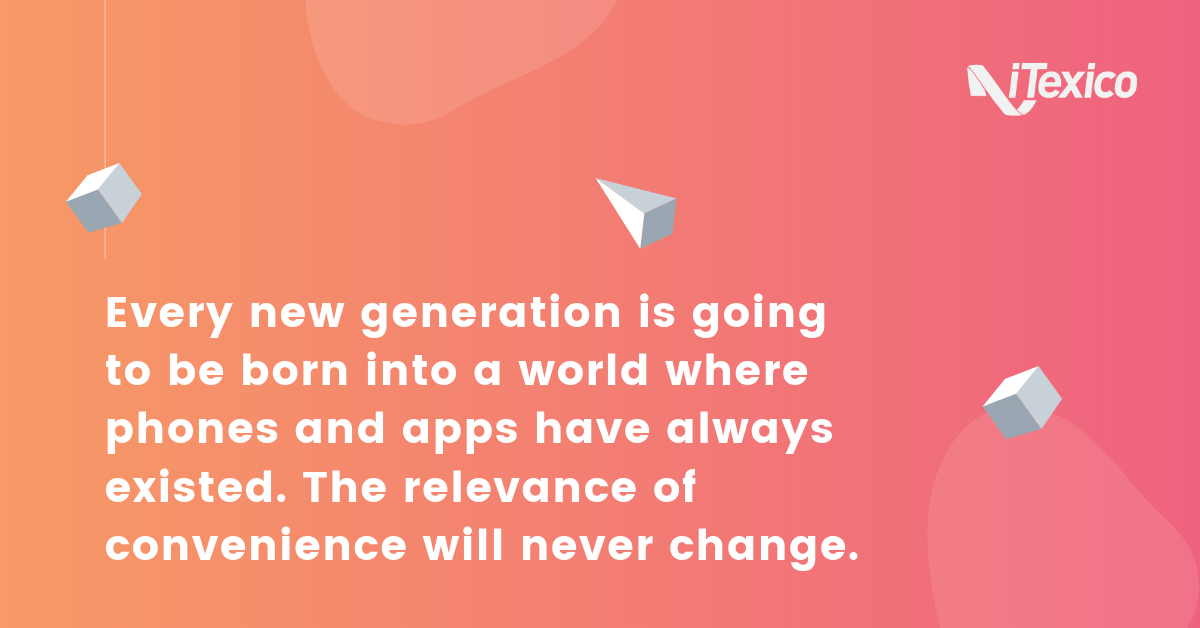Everything You Need to Know About Outsourcing Mobile App Development
The explosive popularity of the mobile app market has been a hard news cycle to ignore. What started off as a fad of cute interactive apps ten years ago has become a predominant player for every modern business to your left and right. There’s an app for everything and everyone: yoga, taxes, sports tracking, stocks, etc. Every competitor in the game wants and needs a finger in the pie.
Developing a mobile app has the potential to make a tremendous difference for businesses seeking new, profitable streets. Whether they’re looking to generate more revenue or increase brand recognition, mobile apps cover every base. There’s no exaggeration: mobile applications are one of the most cost-effective means of profit and accessibility in the present tech scene.
The numbers don’t lie. Through app stores and in-app advertising, mobile apps are projected to generate around $188.9 million USD in 2020. For building app experiences and taking a business to the next level, mobile app development only becomes more of a necessity with each year that passes. Every new generation is going to be born into a world where phones and apps have always existed. The relevance of convenience will never change.
Your time and resources, however, may not be as accommodating as you’d like for app development. That doesn’t mean that you can’t develop an app, you just might have to find the right kind of people who will do it for you. That’s outsourcing, and it’s crucial if you want to develop the sort of app that’s worthy of your company’s image without breaking the piggy bank.
How to Outsource App Development
Hearing about the next great innovation is fine, but it’s not especially helpful if you don’t know how to apply it. Before you go about looking for an outsourcing partner, you need your house in order first. To ensure a successful project, you need to define expectations and what the project will entail. Heading in with a loose portfolio and no game plan leads toward heartache and a big mess.
Communication is the core attribute that makes these partnerships work. If you know what you want from the app, then you’ll be starting off strong. Giving the developing company or freelancer a clear picture to work with eases communications and will make the mobile app development cycle much smoother.
Here are some suggestions of what to consider when defining your app:
- What are the login features?
- Will there be in-app purchases?
- Do you want to have a freemium model?
- Will the app be iOS, Android, or both?
- Do you want it to be native or cross-platform?
- How extensive will social media integration be?
- How will your API and database be hosted?
- Will it be customizable per user preference?
Hammering out the wrinkles before actual development begins will save you time, energy, and cash in the future. Chances are you won’t cover everything you’ll need to cover on the first draft, but what matters is that you sort out enough of the ruckus for a clear path forward.
Finding a Mobile App Development Outsourcing Partner
If there’s one big upside for outsourcing, besides all the services it already supplies, it’ll be that you’re never going to have a lack of selection. Outsource partner hunting is only vaguely similar to the dreaded job search, since as a company you’re going to have plenty of options to choose from. At worst, the most trouble you’ll run into is choosing what partnership will be right for your company.
Outsourcing does not necessarily mean hiring an outsourcing company to take on a project. While hiring an app development agency - either offshore or nearshore - is a popular choice, opting for a freelancer may be more in line of what you’re looking for. Choosing between a freelancer and an outsourcing company depends on what the situation calls for. Both options have respective pros and cons depending on what the needs of the projects are.
Freelancers
Freelancers are at their peak competency when you need a specialist to solve a highly specific task for you. If compared with a tool, they’d be like a surgical scalpel, making effective work on a quick turnaround basis. Chances are you won’t need or want to keep a freelancer on a project for too long, making them ideal candidates for short-term ones that you don’t want to devote more resources than necessary to.
Like everything on this blue marble we call home, freelancers come with their own packet of pros and cons you need to consider before making a final decision.
- Pro - Freelancers are easy to hire through dedicated platforms
You don’t need to look hard to find readily available freelancers. The internet is studded with freelance platforms dedicated to individuals finding jobs putting a line out for new talent. A few of these sites include UpWork, Fiverr, and Indeed, and chances are you’ve already heard about more than a few of them.
If you’re going to run into any issues finding a new freelancer, it’ll be that you may have too much choice. Freelancers tend to be hungry workers, and you may need to take time to sift through the amount of applications you receive in response to your project. However, the more you have to choose from means the better the selection will be once you find the one you’re looking for. - Pro - Great for short-term projects
Not every project you have is going to call for an entire team to knock it out. Smaller projects, while they may be important to the company, don’t call for much attention. Other projects will take precedence, and you may find it challenging to give it the due diligence it deserves.
Freelancers are perfect for these sort of short-term projects. Rather than waste time assembling a team to tackle a project, a single individual can get in, do the work, and finish while your employees are free to focus on other pressing concerns.
Freelancers are highly versatile, plus you’ll still retain oversight while they work. Rather than going through multiple channels to keep in contact with an outsourcing team, freelancers can be directly contacted for progress updates, suggestions, and better communication. They essentially remove the thorn in your side. - Pro - Cost-effective
Finding the cost-effective means for getting a job done without sacrificing the integrity of the project is a priority for most companies. Freelancers tend to fit that niche snugly, owing their cost-effectiveness to no overhead costs, reasonably set rates supplied by the freelancers, and no indirect expenses.
Keep in mind, however, that the cost-effectiveness will vary depending on what freelancer you end up hiring. Lower quality candidates, like students fresh out of school, will generally be cheaper but their work will be less reliable. If you’re planning on hiring an experienced freelancer, expect their fees to be higher than average, accounting for the quality of their work. - Con - Risk of poor communication leading to poor results
We said earlier that being able to directly communicate with your freelancer helps make sure the project maintains a high level of quality. That’s certainly true in concept, but in practice it’s a risk you’ll be taking. Freelancers are self-employed, meaning they’re not on your company’s payroll and are only accountable to themselves.
Lack of diligence on either side can result in a mix-up of communication that impacts the project. If you don’t take steps to ensure the freelancer is delivering on your vision, then the end result carries the potential to be something entirely different from what you were expecting. - Con - Might be unavailable when needed
Accountability comes into play again. Freelancers are their own persons that are not bound by the constructs of your company, allowing them the freedom to choose when and where to work on their projects. While this isn’t a bad thing, they can be prone to other obligations that may affect when they’ll be available for your needs.
Outsourcing Company
Freelancers are good in a pinch, but they’re far from being the ideal choice for every project you’ll find yourself needing finished. For more complex work, you should look into an outsourcing company. Outsourcing mobile app development to an outsourcing company can bring you the kind of team and expertise bound to get your mobile app up and running.
Chances are you’re thinking that while an outsourcing company may the answer for projects a freelancer isn’t suited to deal with, they’re also more expensive. However, that’s not the case when outsourcing with a nearshore mobile app development partner.
But what should you be expecting from an outsourcing company? What makes them as viable as hiring locally?
- Pro - Get a highly talented team of experts from developers to designers, project managers, and more
Outsourcing companies pride themselves on having a cohesive array of highly qualified, diverse team members for any conceivable project. You won’t have to worry about having the right team for the job, or that your outsourcing partner is exaggerating the competency of their employees. Feeling secure in knowing that, by the end of the project, the chances of receiving a complete, viable product are high is, if nothing else, a comforting feeling. - Pro - Up-to-date knowledge on the latest technologies
With the ever-shifting field of technology, it’s important to know that whoever you outsource your mobile app development to are acquainted with the latest changes in the field. Outsourcing companies ensure that their employees are up-to-date, validating their team’s skill and efficiency. You wouldn’t want your doctor using 20-year-old, outdated techniques, would you? Keeping pace with the field maintains reputation, quality, and relevance. - Pro - Long-term work relationship
Freelancers are good for short-term projects, but they’re not feasible for repeated, long-term use for one or more projects. As good as they may be, a freelancer is one person working on a project alone. There’s only going to be so much they can put on their plate.
Outsourcing mobile app development provides you with a compatible team that you can take on larger, more complex projects on a recurrent basis. Once you’ve found yourself settled with a team of specialized workers, you’ll find it easier to fall back on them once a rapport has been reached. Knowing the extent of a team’s capabilities informs and drives your confidence in them to deliver on high-quality projects. - Pro - Efficiency
Delegating your company’s work to an outsourced team creates an opportunity for increased efficiency in overall workload. Letting a dedicated team focus on a single project opens up avenues for reinvigorated focus into your company’s core competencies. With resources being freed up in a project’s absence, other projects can be focused on without losing productivity.
With greater efficiency also comes faster turnaround. An agency that brings access to a dedicated team will provide successful results on a project more quickly. A mobile app development cycle could be completed in half the time that it would have taken you if you kept the work in-house. - Pro - Scalability and flexibility
There are going to be moments in many mobile apps’ development cycles where your resources and team hit a wall and struggle to overcome it. Whether it be an issue of manpower, skill sets, or a simple race against the clock, being flexible can mean all the difference.
Outsourcing companies are inundated with redundancies that ensure consistent means to react to the changes in a project. Having a surplus of skilled workers that you may not need in the beginning of a project provides you with leniency for when you suddenly do.
When you need to change the makeup of your team to address the problem at hand, outsourcing companies provide you with the scalability and flexibility necessary to solve any issues without having to restart the search for new experts. Not only that, but through an outsourcing partner, you can easily increase the resources dedicated to a project as it grows.
While we do have a soft spot for using nearshore outsourcing companies to handle projects, they’re not going to be applicable in every circumstance. Freelancers may be risky, but the resulting benefits from finding a capable, reliable freelancer can have long-lasting impact on the quality of your company’s projects.
For a quick recap: freelancers are great, economical choices for short-term projects that only need one person; while outsourcing companies are excellent choices for larger, more complex, long-term projects.
Establishing a Contract and Project Milestones
Before getting started with your new outsourcing partner, you’ll need to set some expectations. Requesting an outline and project outline from the freelancer or outsourcing company is critical for establishing a precedent for what can be expected from them and to help establish costs.
Besides establishing costs and expectations, you’ll also be given an opportunity to set milestones that will be met during the production cycle. With these milestones set, you’ll be able to assess the development builds over time as well as have time for testing, QA, and final approval. Keeping multiple deadlines to meet provides a balanced structure for the developer team to abide by.
Conclusion
The most important part of setting out to outsource mobile app development is planning. Keeping a structured concept of what you expect the project to be, who will be responsible for it, and how it will be done helps prevent unhappy surprises should you have issues during the development cycle.
Not every outsourcing partner is going to be the perfect fit for your project, whether you’re working with a freelancer or an outsourcing company. Knowing which of those two choices are going to be the fit for your project is half the battle, the other half is finding the right person or team that’s the best fit for your project. Once you’ve found them, establishing a contract and project milestones is the final hurdle before you can get your project underway.
We at iTexico believe in the benefits and effectiveness that nearshore outsourcing can bring to any company’s table. If you’d like to learn more, this article can provide you with more information about what nearshore outsourcing companies can do for you.




Post Your Comment Here